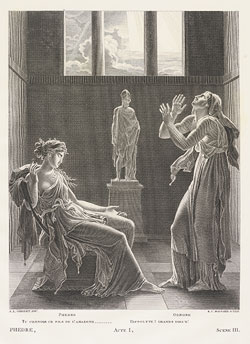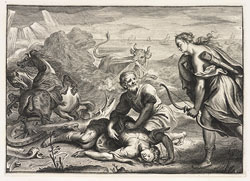Euripides' Hippolytos
Greek playwright Euripides presented Hippolytos, a dramatic retelling of the myth of Hippolytos and Phaidra, in 428 B.C. It is the oldest complete version of the myth to survive. The play was performed on the occasion of the Greater Dionysia, a festival celebrating the spring harvest of grapes and dedicated to Dionysos, god of wine. The festival had evolved into the premier theatrical event of the Greek world by the 400s B.C., when Athens was a leading cultural, artistic, intellectual, and scientific center. Three years before the play's performance, in 431 B.C., Athens had instigated a conflict with Sparta. This conflict, known today as the Peloponnesian War, would last almost 30 years and end with the humiliating defeat and dismantlement of Athens's democratic government. One of the playwright's main motivations would have been to adapt the myth, already ancient in his day, to demonstrate its relevance to a contemporary audience. |
||||
Euripides' Message Hippolytos, whose identity is based on obsessive control, may be a symbol of Athens and its imperialist military program. The chariot, which he previously so masterfully steered, may represent a war machine that Euripides predicts will be the cause of Athens's tragic downfall. Most interpreters of Hippolytos have agreed that Hippolytos brought his ruin on himself by repressing his sexuality, a fundamental aspect of his human nature. The monstrous bull that causes his violent end could represent male sexuality, which Hippolytos futilely tried to deny in himself, only to have it destroy him. |
||||

